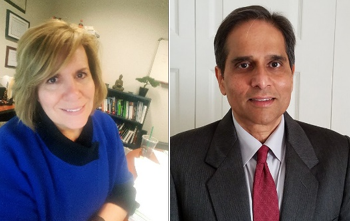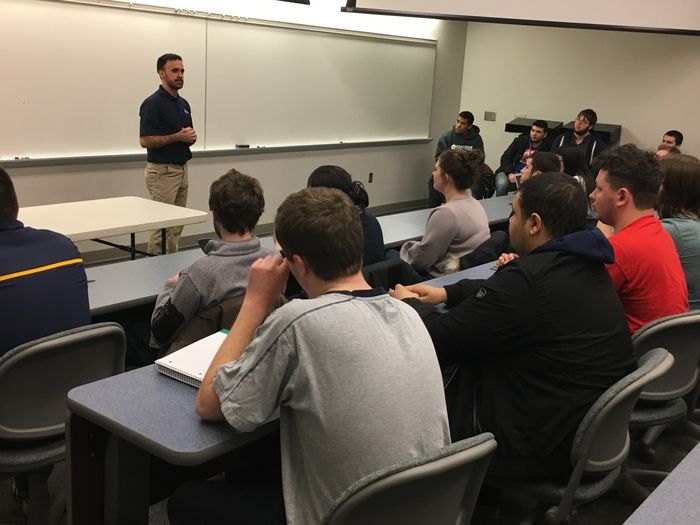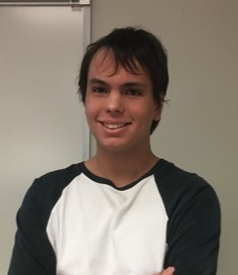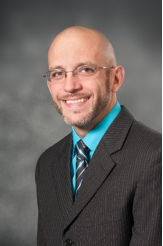In This Issue:
Welcome
This has been a busy semester for Management Information Systems. There are more students in various business majors who recognize the value of MIS to all majors. The number of those choosing to double major or minor in MIS is continuing to grow. In talking to many organizations, they have indicated they want to hire students who have MIS skills, no matter what their major. The MIS Club is under new leadership, with Christian Brooks currently presiding as president. Meetings will be held on Tuesdays at 5:00 p.m. Check BehrendSync for specific dates and locations as it changes due to speaker series.
There will be an extensive speaker series with industry experts speaking on topics relevant not only to the MIS major but also to all students in the Black School of Business. We had HM Health Solutions on October 16 from 4:00 to 5:00 p.m. They talked about their company and upcoming opportunities for students. On October 25, Eric Brotherson presented “A Realistic Perspective in a Data Driven Career” and on October 30, Russ Martin presented on rapid application development. These are all topics that will be valuable to all business students. We have many more speakers in the upcoming months.
We have two new full-time faculty member in MIS. Dr. Babajide Osatuyi, assistant professor of MIS, started teaching in January and will lead the Data Analytics track. He will be teaching at least three data analytics courses (MIS 345 Introduction to Data Analytics, MIS 415 Social Media Management and Analytics, and MIS 447 Data Warehousing). He comes to us with significant teaching and research in data analytics and business intelligence. Kyle Chalupczynski, lecturer in MIS, began teaching this fall. He is currently teaching MIS 204 Introduction to Business Information Systems and will teach one section of MIS 430 Systems Analysis in the spring. Chalupczynski is an alumnus of the MIS and MBA programs and comes to us with significant industry experience, having previously worked for General Electric and Erie Insurance. Russell Martin will join us as an adjunct instructor in the spring, and he will be teaching MIS 297 Rapid Application Development Mendix. Mendix is a low-code software platform. It provides tools to build, test, deploy, and iterate applications. We also will be offering Python programming taught by Scott McAuley, lecturer in MIS. As you can see, we are staying on the cutting edge of industry standards in MIS.
The MIS Club is evaluating opportunities for additional speakers and field trips. If you have any suggestions, please contact Christian Brooks at [email protected]. If you have any questions about the MIS major or minor or any of the tracks, feel free to contact Dr. Kathleen Noce at [email protected].
Sincerely,
Dr. Kathleen Noce, Disciplinary Lead, MIS
Dr. Ash Deshmukh, Department Chair, Accounting and MIS
Faculty Spotlight
Scott McAuley, M.B.A.
I enjoy using summers to apply what I know to different areas of discipline. It is gratifying to see educational concepts applied in the field. This ties in nicely with the Black School of Business’ learning-by-doing philosophy.
My teaching style in MIS is very hands-on in applying business concepts. I believe in providing detailed lectures and demonstrations on complex topics and then requiring assignments on those topics for students to master them. I believe in providing students the ability to earn points on multiple assignments. In some classes, I have daily quizzes. (I am hoping to earn the nickname “Mr. Quiz.”)
My favorite part about being a faculty member is being able to guide students. Seeing students master new concepts is truly a joy. The great thing about MIS is the constant change in technology. It is never boring! Seeing how that technology can be applied in business to improve efficiency is very satisfying. On a recent MIS Club field trip to Welch’s North East, we saw many new technologies applied in the past two years to improve manufacturing efficiency.
In my free time, I consider myself a “gentleman farmer” with my Christmas trees. I have approximately one hundred trees left on my property. I also enjoy working on my two classic cars and motorcycle. I am also trying to teach myself to play the acoustic guitar. Much to my wife’s dismay, I also like working on old lawn mowers and farm equipment. If I can fix them, I keep them forever. I am up to five riding lawn mowers, two rototillers, four push mowers, and one tractor. There are more that I want, but I will have to build a new building to store them in. That probably won’t happen.
At Behrend, I worked as a part of a team that brought the Oracle Applications Users Group (OAUG) to campus. OAUG is a nonprofit national organization dedicated to furthering the education and use of Oracle. I also worked very hard to bring Behrend into compliance with updated Oracle Cloud Applications. Oracle Cloud supports mobile devices in a very user-friendly format. I have already begun the process of creating new courses using this technology.
Alumni Spotlight
Adam Dzuricky ’02
What is your current position and where?
I am currently the senior information security solutions engineer at Erie Insurance. I have been in this role for more than five years, and it has changed significantly over that timeframe. Currently, I am responsible for establishing the near- and long-term direction of the Erie Information Security program by measuring our capabilities against industry best practices that align with trusted information security frameworks. I interact with many different areas and levels of personnel within Erie. There are days where I speak with a policy processor about a malicious email they received, a mid-level project manager about a solution’s planned information safeguards, or a subcommittee for the board of directors about our enterprise security methodology. Being responsible for effectively engaging a large, diverse audience requires me to clearly understand our InfoSec program and then ensure I communicate in a way that it is received accurately.
How did you find your current job?
I have had a very interesting career path to get to where I am today. When I was still in college, I was an intern at GE Transportation with a focus on graphic design, Adobe Flash animation, 3D animation, web development, and database administration. From there, I took a full-time job at a small local company for about two years. I had the title of IT specialist, which was a short way of saying IT “Jack-of-all-trades.” In this job, I continued to do some graphic design, web development, and database administration, but I added network administration, technical support, and customer service. Then I had the opportunity to join Erie Insurance as an IT service desk technician. In taking this role, I made the choice to reduce my annual pay, but did so due to my desire to be part of Erie. I worked in the IT service desk for three years before joining the information security team in an entry-level role. I have spent the last twelve years growing personally and professionally within the information security practice. Not only did I grow, but so did the team. We went from four employees up to twenty-four employees today. To get to the job that I currently have, I took chances and suggested creating a higher-level individual contributor role that had a focus on information security. Erie Insurance had recently done this with other areas of IT, but not within information security. Eventually, the role was created, I bid on the role, and I was offered the job.
What steps did you take while at Behrend to help you prepare for your current job?
My degree is in Management Information Systems, which exposed me to many different aspects of the business world and how technology plays a significant role in enabling their processes. One of the greatest values I got from my time at Behrend was being challenged how to learn and then apply that knowledge. For example, I remember taking my COBOL classes and thinking, “What am I going to do with this? I don’t see myself doing COBOL work.” And although that was true for me, I came to realize that no matter what coding language I was learning, it wasn’t about the specific language. I was learning how to understand a new concept, which I could then apply to other situations in my life. I took the ability of learning coding logic in COBOL and I shifted it with the different syntax of the web development languages I was using regularly. I found the value of being able to learn something and apply it on broader terms.
What do you like best about your job or your employer?
I love my job, and I love where I do it. If I really had to pick one thing that I loved about my job, it would be my team. The InfoSec team is a unique and diverse set of people who care. We care about our responsibilities. We care about our company. We care about our purpose and mission. We care about our services and going the extra mile. Most of all, we care about each other. I have had other opportunities to potentially work on other teams for other companies for more money or in warmer locations, but I stay here because I love what I do and my team. Poetics aside, I truly love being responsible for providing guidance and direction for the InfoSec program and team. I find it very exciting to be constantly learning about newly discovered vulnerabilities, evolving attack patterns used by threat actors, and advanced protective techniques. I also have a great sense of purpose and impact. I am a member of a team that defends our customers, our employees, and the community from the effects of a cyber attack. Knowing that our actions could change the lives of others and their families motivates us to do our very best each day.
Do you intend to pursue any further education or training?
I do. To be successful in a role such as mine, I have to be a life learner. I have spent a fair amount of my time learning new things. This ranges from topics such as leadership, InfoSec frameworks, process lifecycles, and financial management. From an InfoSec-specific perspective, I have attended educational courses about digital forensics, incident response, hacking techniques, policy and standards creation, and chief information security officer (CISO) preparedness. Being able to learn something and then applying it to solve problems or create new opportunities is how I enjoy adding value. To take it to the next level is when I get to share these thoughts and ideas with others. Helping teach others new things I’ve learned is extremely satisfying, especially when they come back to tell me their stories of how it helped them. This is one of the main reasons why I plan to pursue a master’s degree, either an M.B.A. or InfoSec-focused, in the near future.
How has your minor/certifications helped you?
I think of minors and certifications in two different ways. Minors I see as extensions of the knowledge gained from your degree focus. They provide broader exposure to other aspects of the career you are looking to build. For example, I had a Management minor. I wanted to understand more about fundamentals of business management and pursuing the minor would enable me to achieve that objective. Certifications are different. At their highest level, they provide evidence that you achieved a certain level of comprehension on a specific topic at a specific point of time. I have some certifications, such as CISSP (Certified Information Systems Security Professional) and CCSK Plus (Certificate of Cloud Security Knowledge), and I am proud that I was able to obtain them. Did they help me directly with my career path? Not significantly. Do I think they can help new talent get an interview? Yes. Some employers will only interview people with specific certifications. For example, in InfoSec, some companies expect to see young professionals with Network+, Security+, and other certifications. They use this as a way of screening their potential talent pool. My belief is that there is always more to a person besides a certification, so we currently don’t have those as requirements to join our team. We will encourage new team members to obtain the correct certifications over time, but with the intent of gaining the knowledge to be applied within their responsibilities and contributions. The certification provides the evidence of a certain level of comprehension of specific topics. The applicable education is more important than the certificate.
What advice do you have for future graduates?
- Understand before being understood.
- Learn to apply and then share with others.
- Be patient and committed to yourself, your family, and all those you serve.
- Don’t always believe what you think. Be open to ideas.
- Shut down, unplug, and GO PLAY! You’ll be surprised how stepping away can help get you unstuck.
- Why do we fail? Don’t fear failure. Own it and learn from it. Aim to not learn the same thing twice.
What would you tell your college self if you could go back in time?
Invest in being involved with social media, which is always changing. Believe in yourself and do what you think is right. Everything happens for a reason. Why just words of encouragement? I have a great life. I have had my share of ups and downs. I have survived them all. I have grown stronger every day, and I have never given up. Each experience helped shaped me for the version of me that I needed to be at different stages of my life. I have a sense of purpose, accomplishment, and desire to keep doing more. On top of all that, I’m happy. Was it easy to always believe it would be okay or that things would work out for the best? Not at all, so that is why I would let myself know to keep trying.
What does your employer look for in an undergraduate MIS student?
I know there are some requirements around GPAs to be part of our internship program, but we go way beyond the numbers when seeking out new, young talent. We want people who are thinkers and doers. We want people who want to learn and give their very best each day. We want people who care and want to make a difference in the community, are willing to challenge the status quo, and be part of a collaborative team. Take time to look at yourself and what you are doing. Don’t just focus on the academics, but the extras as well. Tell your potential employers about the clubs that you are part of, any leadership roles you’ve taken with activities, teams you were part of, and community outreach initiatives you’ve contributed to. Start by documenting it in your resume and do so in a way that they want to hear more, so they call you in for an interview. Lots of great things can happen when you get to tell your story. Let them see why you would help make their team stronger and want to invest in your future growth.
Student Spotlight
Evan Tatara ’20
I will be graduating in spring 2020 with a double major in Management Information Systems and Project and Supply Chain Management with minors in Game Development and Computer Science and certifications in Oracle and SAP. Also, I am looking into getting Six Sigma certified at Penn State at some point.
I am currently a student and part-time grader for Scott McAuley, lecturer in MIS. I had taken MIS 204 Introduction to Business Information Systems and MIS 336 Database Management Systems with Mr. McAuley and volunteered to help in the class if students needed help catching up. This then turned into a paid job with the added responsibilities of helping to grade assignments.
How did you get your job?
Being personable, understanding, and passionate about MIS in general.
I enjoy grading students and giving direct productive feedback. It’s also satisfying to help speed up the flow of the class by assisting students who fall behind. Mr. McAuley is a great supervisor because he’s very relaxed, understanding, kind, and a great mentor to me and his students. I have been contemplating whether I’ll have time to pursue the Business Analyst focus of the MIS degree along with the planned Systems Analyst option. Otherwise no, I’ll be looking for a good job immediately after graduating. The certifications will really allow me to be well versed and ready for the ERP system my future employer uses, whether it be Oracle, SAP, or anything else. With the minors, I’ll have team and programming experience from the Game Development minor along with conceptual and technical knowledge from the Computer Science minor, which should make me more desirable to work with on certain technical projects.
What advice do you have for other students?
Eliminate distractions, find a study plan or group that works for you, and make sure that you’re enjoying what you’re pursuing. If you pursue something that you find a pain even though it pays well, you’re not going to be happy or passionate, which is going to cripple your morale and desire to grow in knowledge. My advice is to realize that sooner rather than later, unlike how when I realized I wasn’t enjoying my Software Engineering major and decided to switch to MIS and add Project and Supply Chain Management soon after. I would have told myself to do MIS right from beginning because it’s something I fully enjoyed doing no matter the class I was taking.
What classes helped you the most?
Either CMPSC 121 Introduction to Programming Techniques with Ronald Del Porto, who is now retired, or MIS 430 Systems Analysis with Dr. Ido Millet, professor of MIS. I thought both classes were presented very well and were very insightful. You cover a lot of material and they really change your perspective on some things. One on how you view a company, its processes, systems, and tools; the other enlightens you on how programming works with fun, interesting, and engaging exercises. One is low level and the other high level, but both are essential introductions to important aspects of many industries that are successful today.
Club Updates
The MIS Club elected a new executive board last semester. Members are Christian Brooks, president and MIS major; Matthew Popovnak, vice president and Software Engineering major with an MIS minor; Spencer Randall, treasurer and Accounting and MIS major; and Evan Tatara, MIS and PSCM double major with Computer Science and Game Development minors. The club held two major events in the spring 2018 semester, a field trip to the Welch's plant in North East, Pennsylvania, to meet Chuck Todd, an IT professional at the company, and a presentation about information security by Behrend alumnus Adam Dzuricky ’02 with attendance of approximately eighty-one people. Our future plans involve more field trips with potential destinations that include the Amazon and Google headquarters. Elections for new MIS club officers took place on October 28.
Events
On October 16, HM Health Solutions offered an information session on who they are and what they do and opportunities for Behrend students.
On Thursday, October 25, Eric Brotherson ’08 presented “A Realistic Perspective in a Data Driven Career.”
Eric J. Brotherson currently serves as director of business intelligence at Erie Federal Credit Union. With nearly fifteen years of financial services experience in marketing and business intelligence, Brotherson continues to cultivate and refine his skills in data analytics, project management, corporate branding, big data mining and web design and management. His main focus areas include business intelligence technology, data analytics, and digital marketing. Brotherson’s background includes successfully facilitating and managing targeted marketing, behavioral strategies, predictive modeling, corporate cultural change, data flow and organizational operations, executive reporting, and web development/social media/SEO. In 2013, Brotherson was nominated for CUES Next Top Credit Union Executive. Throughout his tenure at Erie FCU, he has elevated the credit union presence and brand with his collaborative work efforts that have won several national awards for marketing to members, product development, and website design. He has participated in several political advocacy events as an ambassador promoting credit union values, mission, and stance for communities both locally and nationally. Brotherson has presented at several national conferences, speaking on topics including trends in the auto lending industry, best practices in relationship management software, trends in big data management, and developments in digital marketing.
Brotherson serves as an MIS Advisory Board member for the Black School of Business. He is a Volunteer Board member with the American Heart and Stroke Association Erie Division, and is the creative director for Young Erie Professionals.
Brotherson holds a B.S. in Management Information Systems and an A.S. in Business Administration with minors in Management and Technical Sales from Penn State Behrend and is SAP R/3 certified. In his free time, he enjoys traveling, skiing, programming, and spending time with his family.
On Tuesday, October 30, Russell Martin ’04 ’06 M.B.A. presented “Rapid Application Development.”
Russell Martin is a senior software engineer at Erie Insurance focused on the engineering practices of rapid application development and cloud technologies and the mentoring of apprentices and interns. He was part of a team that developed an agent-facing system that enabled agents to receive quotes within five minutes as compared to several days or weeks. He also has participated in several corporate hackathon events.
In addition, he is focused on the enterprise rollout of the Mendix platform and helping to develop enterprise solutions for both the business and information technology.
Martin earned a Bachelor of Science degree in MIS and a Master of Business Administration degree from Behrend. He is expert certified as a developer in the Mendix platform as well as certified to teach the intro and advanced level courses for the platform. Martin has over fifteen years’ experience in the IT field in such areas as database programming, web design, industrial automation, project management, and IT consulting work.





